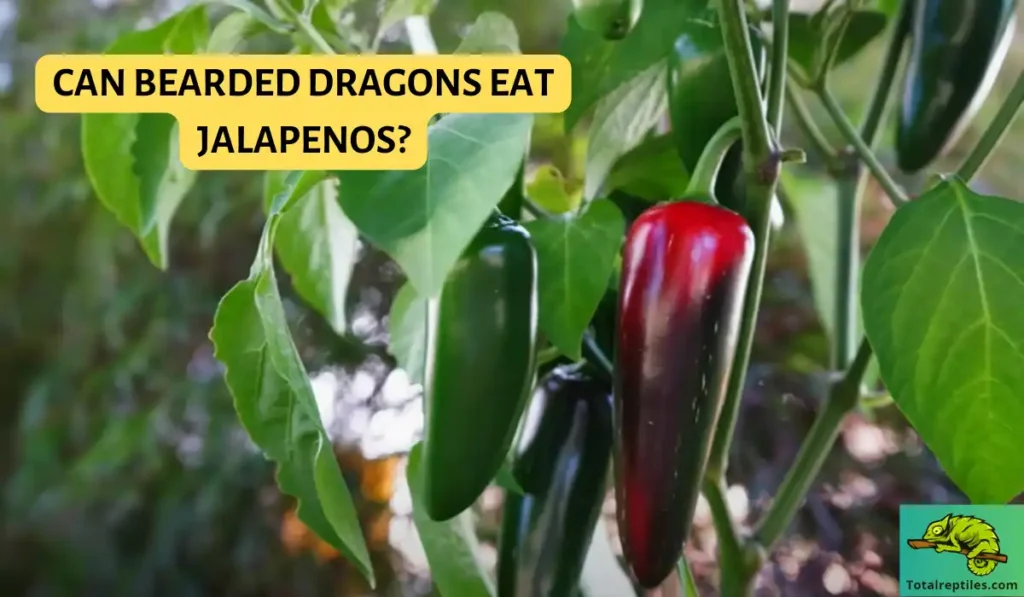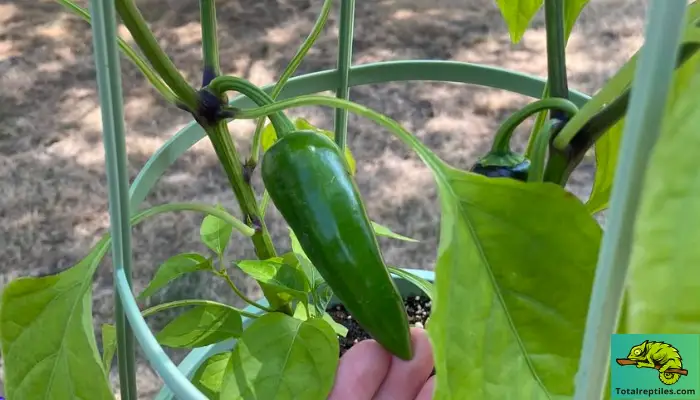In short – yes, but only sparingly. While an occasional jalapeno slice may be okay for most adult beardies, these spicy peppers are not an ideal regular part of their diet. This Mexican food ingredient contains capsaicin, which gives them their signature fiery kick. Too much capsaicin can irritate your bearded dragon’s sensitive digestive system.
You’re making a salad for dinner and throw in a few jalapeno slices for a kick of heat. Your Beardie watches closely from her terrarium. When you look back, you hear crunching. You turn over to see her blissfully eating jalapeno!
Breathe deeply before panicking. Eating a bit of spicy pepper isn’t necessarily dangerous. But is it healthy? Should they eat jalapenos? Let’s look.
This article covers everything about feeding bearded dragons jalapenos.

Are Jalapenos Safe for Bearded Dragons?
The hot kick of jalapenos usually comes to mind first! Capsaicin burns your tongue by activating receptors.
Humans and bearded dragons react differently to capsaicin. Reptiles sense heat differently. That doesn’t mean feeding jalapenos is safe.
Can Too Much Capsaicin Harm Your Beardie?
Bearded dragons don’t taste spiciness the same as us. But, ingesting large amounts of capsaicin can still irritate their digestive system.
Some potential risks of too many spicy peppers include:
- Digestive upset: symptoms like diarrhea, loose stool, vomiting
- Stomach irritation and inflammation
- Loss of appetite
- General lethargy or weakness
Too much capsaicin can seriously disrupt your Beardie’s GI tract. It’s better to play it safe and only feed small amounts occasionally.
Moderation is Key with Jalapenos
The consensus is bearded dragons can eat jalapenos in moderation. A few small pieces every month or two are likely fine. Just be sure to:
- Remove seeds and ribs to decrease spiciness.
- Chop into bite-sized pieces.
- Watch for signs of an adverse reaction.
Jalapenos should never become a regular part of the diet. The risks outweigh the benefits.
Choose Milder, Non-Spicy Peppers
Rather than jalapenos, choose milder sweet peppers without capsaicin:
- Bell peppers (red, green, yellow, orange)
- Poblano peppers
- Sweet banana peppers
These provide nutrients without irritating the digestive tract.
Baby Bearded Dragons and Spicy Food
Never feed jalapenos or other spicy peppers to baby bearded dragons. Their young digestive systems are extra sensitive.
Stick to greens, veggies, and insects to safely nourish growing babies. Avoid anything spicy that could cause gastrointestinal distress.
Adult beardies can likely tolerate small amounts of jalapenos occasionally. But there are safer, healthier veggie options out there. Spicy peppers should never make up a significant portion of their diet.
Nutritional Content of Jalapenos
So, jalapenos can be fed to beardies in moderation. But how nutritious are these spicy peppers? Let’s list what vitamins, minerals, and other beneficial compounds contain.
Some Vitamins and Minerals
- Jalapenos do provide some nutritional value. Benefits include:
- Vitamin C: Antioxidant that supports immune health
- Vitamin A: Important for eye and skin health
- Vitamin E: Helps prevent damage to cells
- Vitamin B6: Aids metabolic function and red blood cell production
- Potassium: Important electrolyte for nerve signaling
- They also contain small amounts of iron, phosphorus, and magnesium.
So, in moderation, these spicy peppers can contribute beneficial vitamins and minerals. But they aren’t a nutritional powerhouse.
Lacking in Key Nutrients for Bearded Dragons
Here’s where jalapenos fall short:
- Low calcium: Beardies need high calcium for strong bones and metabolism. These peppers don’t provide much.
- High phosphorus: Too much phosphorus can prevent calcium absorption, leading to metabolic bone disease.
- Mostly water: Around 90% water means are hydrating but not very nutrient-dense.
Spicy peppers don’t deliver the key Nutrition BD needs. Far better veggie choices are high in calcium without excess phosphorus.
Not an Equivalent Replacement for Insects
Vegetables should only partially replace insects in a bearded dragon’s diet. Jalapenos lack the Protein and other nutrients crickets, worms, roaches, etc., provide. While providing some benefits, this spicy pepper is not a nutritional staple for optimal BD health. They don’t deliver enough calcium and Protein.
Preparing and Serving Jalapenos
Proper preparation is key if you choose to feed your beardie jalapenos occasionally. Follow these steps:
Remove Seeds and Ribs
The highest concentration of capsaicin is found in the ribs and seeds. Remove these to reduce spiciness:
- Cut the peppers in half lengthwise.
- Use a spoon to scoop out the seeds and white ribs.
- Rinse under water to remove excess capsaicin.
Leaving seeds and ribs in increases irritation risk.
Chop Into Bite-Sized Pieces
Bearded dragons can Choke on large pieces. Prevent this by:
- Dice the jalapeno into small cubes.
- Cutting each piece no larger than the space between the eyes.
Proper bite-sizing reduces choking hazard.
Mix With Other Veggies
For more balanced nutrition, mix a few pieces in with other chopped veggies like:
- Bell peppers
- Zucchini
- Squash
- Carrots
Only Once a Month
Even in moderation, jalapenos should be an occasional treat. Stick to only a few pieces once a month at most. Anything more often can cause digestive issues over time.
Better Vegetable Options than Jalapenos

We’ve covered proper jalapeno preparation and feeding guidelines. But there are much healthier veggie choices for the diet. Though okay in moderation, spicy peppers should not be a dietary staple. Choose produce that provides more calcium and key nutrients:
Focus on Calcium-Rich Greens
Bearded dragons need high calcium levels for bone health and to prevent metabolic bone disease. Choose dark leafy greens loaded with calcium:
- Collard greens
- Mustard greens
- Dandelion greens
- Kale
- watercress
- Bok choy
- Turnip greens
Aim for greens with at least 100mg of calcium per 100g serving.
Squashes Add Benefits
Squashes like zucchini, yellow squash, and butternut squash also make excellent choices.
Benefits include:
- High moisture content
- Vitamin A
- Potassium
- Fiber for healthy digestion
Squashes are nutrient-dense hydrating options.
Other Nutritious Veggies
Round out Beardie’s vegetable intake with the following:
- Snap peas – fiber and vitamin K
- Okra – calcium, magnesium, and folate
- Green beans – vitamin C and K
These provide a variety of vitamins, minerals, and antioxidants missing from jalapenos. Experiment to find which healthy options the pet enjoys. Just steer clear of lettuce and high-phosphorus spinach.
FAQ
Can bearded dragons have spicy food?
Generally, no. Bearded dragons don’t register spiciness as humans do. But they still may find jalapenos unpleasant. Reptiles evolved, eating greens and insects, not hot peppers. Many react negatively when offered spicy foods. Don’t force jalapenos on beardies. Only feed if they seem to enjoy small amounts.
What kind of peppers can bearded dragons eat?
Bearded dragons can eat a variety of peppers, including:
- Bell Peppers
- Red Peppers
- Green Peppers
- Poblano Peppers
Feeding peppers in moderation, ideally 1-2 times per week, preferably cooked, is important. Due to solanine, hot peppers can cause serious sickness in people and animals if eaten in high amounts.
Conclusion
While an occasional jalapeno piece may be okay for most adult bearded dragons, these spicy peppers do not provide optimal nutrition.
Focus on healthier greens, veggies, and insects to meet your Beardie’s dietary needs. Skip capsaicin, which can irritate sensitive digestive systems. With so many better options, spicy peppers are an unnecessary gamble.
For a long, healthy life, nourish the body, not just their adventurous appetite. With the right diet, you’ll have a happy dragon for years!

